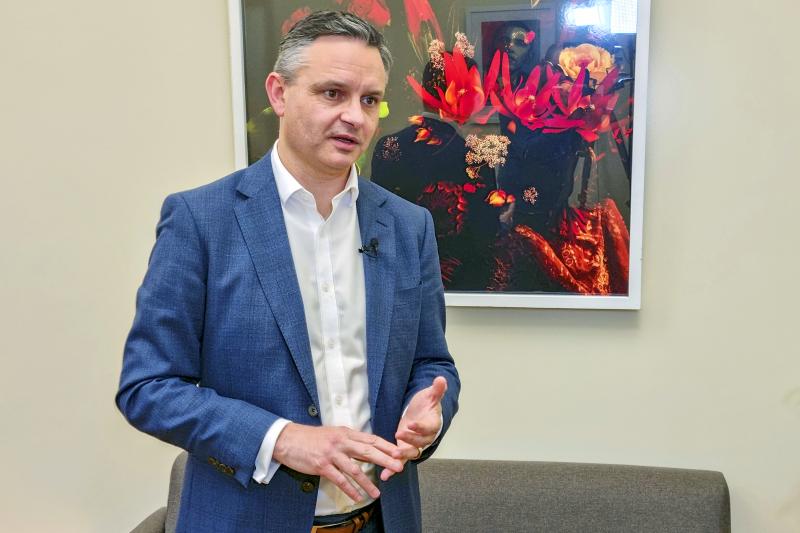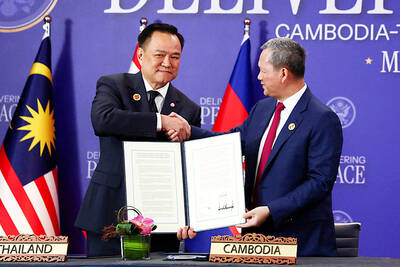New Zealand yesterday put forward a raft of carbon-cutting plans, ranging from reduced vehicle usage to making e-bikes more accessible to meet its target of becoming carbon-emission free by 2050.
The proposals — which come ahead of the COP26 climate meeting of world leaders in Glasgow, Scotland, at the end of this month and are a forerunner to the New Zealand government’s emissions reduction plan expected in May next year — drew immediate criticism.
New Zealand is under pressure to do more to curb carbon emissions, which are increasing, but the discussion document made little mention of agriculture, which contributes 48 percent of its greenhouse gas emissions.

Photo: AP
Environmental group Greenpeace said that the document was “full of meaningless waffle” that did little to broach the conversation on reducing agricultural emissions.
Climate advocacy Generation Zero called it a “disgrace” that failed to meet “unambitious emissions budgets, completely ignores agriculture — which makes up half of our emissions.”
However, New Zealand Minister for Climate Change James Shaw said that there was “an entire work program” dealing with the agricultural sector and “we didn’t want to waste people’s time by including things that have either already been consulted on or have other kind of engagement processes elsewhere.”
New Zealand Prime Minister Jacinda Ardern said the plans would reduce emissions, and “can also create jobs and new opportunities for Kiwi businesses and our economy.”
The document comes almost two years after New Zealand passed its Zero Carbon Act and a year after the government declared a climate emergency.
Ardern has previously described action on climate change as a matter of “life or death,” but has been called out by Swedish environmental advocate Greta Thunberg, who accused New Zealand of being “one of the world’s worst performers” on emission increases.
“People believe Jacinda Ardern and people like that are climate leaders,” Thunberg said last month. “That just tells you how little people know about the climate crisis. Obviously, the emissions haven’t fallen. It goes without saying that these people are not doing anything.”
Many of the initiatives mentioned in the discussion document are from a New Zealand Climate Change Commission report presented to the government earlier this year, including a 20 percent reduction in the use of vehicles by 2035.
In the same period, New Zealand wants to reduce emissions from transportation fuels by 15 percent, make public transportation cheaper and more accessible, and introduce incentives for those on low incomes to buy electric vehicles.
Other ideas include the development of low-emission fuels, such as bioenergy and hydrogen, eliminating the use of fossil gas, reducing food waste and encouraging composting.

Shamans in Peru on Monday gathered for an annual New Year’s ritual where they made predictions for the year to come, including illness for US President Donald Trump and the downfall of Venezuelan President Nicolas Maduro. “The United States should prepare itself because Donald Trump will fall seriously ill,” Juan de Dios Garcia proclaimed as he gathered with other shamans on a beach in southern Lima, dressed in traditional Andean ponchos and headdresses, and sprinkling flowers on the sand. The shamans carried large posters of world leaders, over which they crossed swords and burned incense, some of which they stomped on. In this

‘NO COUNTRY BUMPKIN’: The judge rejected arguments that former prime minister Najib Razak was an unwitting victim, saying Najib took steps to protect his position Imprisoned former Malaysian prime minister Najib Razak was yesterday convicted, following a corruption trial tied to multibillion-dollar looting of the 1Malaysia Development Berhad (1MDB) state investment fund. The nation’s high court found Najib, 72, guilty on four counts of abuse of power and 21 charges of money laundering related to more than US$700 million channeled into his personal bank accounts from the 1MDB fund. Najib denied any wrongdoing, and maintained the funds were a political donation from Saudi Arabia and that he had been misled by rogue financiers led by businessman Low Taek Jho. Low, thought to be the scandal’s mastermind, remains

Near the entrance to the Panama Canal, a monument to China’s contributions to the interoceanic waterway was torn down on Saturday night by order of local authorities. The move comes as US President Donald Trump has made threats in the past few months to retake control of the canal, claiming Beijing has too much influence in its operations. In a surprising move that has been criticized by leaders in Panama and China, the mayor’s office of the locality of Arraijan ordered the demolition of the monument built in 2004 to symbolize friendship between the countries. The mayor’s office said in

FIGHTING CONTINUES: Thai military dropped 40 bombs on border areas, Cambodia said, while Bangkok said Phnom Penh launched heavy attacks and damaged homes Cambodia yesterday accused Thailand of intensifying its bombardment of disputed border areas, even as officials from the two countries attend a multi-day meeting aimed at negotiating an end to deadly clashes. The neighbors’ long-standing border conflict reignited this month, shattering an earlier truce and killing more than 40 people, according to official counts. About 1 million people have also been displaced. Cambodian and Thai officials were in their third day of talks at a border checkpoint, with ministers of defense from the two countries scheduled to meet today. However, the Cambodian Ministry of National Defense said Thailand’s military carried out a heavy